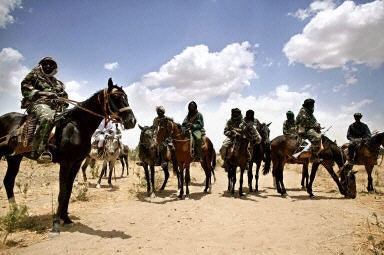
Just Like the Early States-Men
“[T]here remains a relatively small number of farming villages such as Kuteri where people are struggling to maintain dignity under the yoke of the government-backed Arab militiamen, who eat their food, drink their water and lounge under the spare shade of low, twisted trees.”
From the Washington Post, “A Darfur Village Bears Up Under Janjaweed Yoke.”
The paragraph above is followed by another, which shows how people realize that surviving and paying tribute and homage is, for most, better than resisting and being killed or fleeing:
“‘We think that here, we are freer,’ Ahmed said. ‘We are better than we would be in the camps.'”
The standard account — horse-riding nomads conquering settled agricultural populations — was written by Franz Oppenheimer and Alexander Rüstow. (Rüstow’s great work was excerpted and published in English as Freedom and Domination: A Historical Critique of Civilization.










The fact that states arise when a particular band of ruffians manages to impose its will on a larger population is not under dispute. But this band of ruffians need not be horsemen (how else could the Inca, Maya and Aztec states have emerged?), herdsmen, or even nomadic. Is there any Western European state whose emergence had anything to do with nomadic herdsmen? I mean the Franks, the Goths, the Saxons, were all thugs but they weren’t nomads (at least not at the time they got around to the state building business). This is historical theory without history. Sometimes called “making crap up”.
That would only be true if the claim were that all states emerged that way. But the emergence of at least some states from conquest by non-settled peoples is rather well documented. Take the Vikings, who conquered Normandy (named from the “Northmen”) and in 911 the pirate Hrolf became the Duke Rollo. They traveled on ships, which allowed them to plunder the coasts and to sail the rivers inland and plunder (using their small horses, which they could put on river-going ships). Then, in 1066, William the Bastard (Duke of Normandy) invaded England with his army and conquered the local population. They weren’t nomads (normally, the term refers not to mounted herdsmen on the move, in any case, but to people who travel from place to place on a regular basis, from the valley to the mountain, for example), but they did conquer a settled population and live from them parasitically. As they found, of course, you can sometimes get more loot if you plunder less rapaciously or less irregularly. Moving from the status of “roving bandits” to “stationary bandits,” as Mancur Olson described the process, can lead to more freedom for the conquered and more wealth for all. (Olson’s last book is especially good on this: “Power and Prosperity” — http://www.amazon.com/Power-Prosperity-Outgrowing-Capitalist-Dictatorships/dp/0465051960/ref=pd_bbs_sr_3/104-2654352-3659152?ie=UTF8&s=books&qid=1174772772&sr=8-3 ).
(An alternative anthropological approach, which focuses on the importance of geographical enclosure, can be found in Robert Carneiro’s work on state formation in pre-Columbian America.)
Thanks!